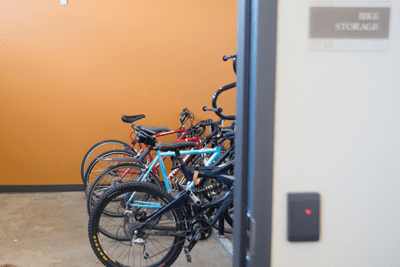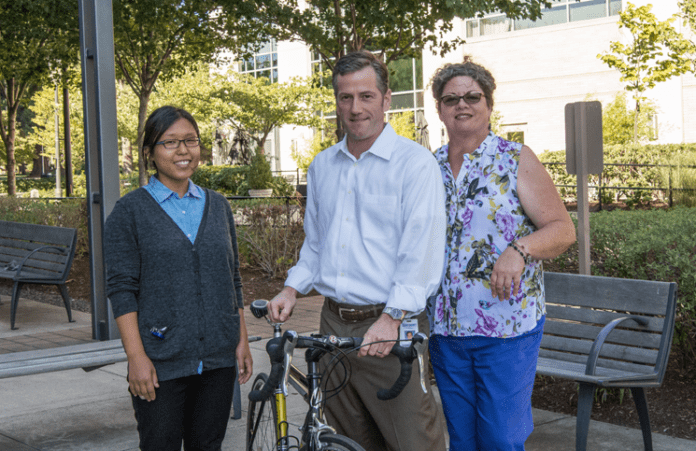With highways around the region at (and in many places, above) capacity, commuting to and from work is, for many, like pulling teeth. In an effort to ease the stress – and with it, workforce productivity – a growing number of companies are encouraging their employees to think of alternative ways to get to work.
Earlier this week, Bonneville Power Administration (BPA) hosted a Transportation Fair for its metro-area employees. The agency has been encouraging its workers to bike, walk, carpool or take mass transit for years.
“Alternative travel to work, like biking, definitely improves work performance, said Dave Wilson, BPA media relations. “The employees are healthier [and] motivated to do a better job. There is less absenteeism.”
Perhaps BPA’s most successful attempt at encouraging alternate travel to work is its bicycle program, which includes a buddy program that pairs up bikers in various cities (Vancouver included) who would like a bike partner. There’s also a bicycle newsletter for hundreds of employees, written by program coordinator Hannah Dondy-Kaplan.
Dondy-Kaplan said that the number of employees participating in BPA’s bicycling program has doubled in the last two years.
“We hold the bicycle workshops with 400 to 600 employees in sessions,” said Frank Dunn, BPA transportation program manager. “We also offer use of the 905 Building Fitness Center (in Portland) to bikers. They use showers and lockers. We also have a loaner bike program where employees can reserve a bike for outings at lunch or on breaks. We have 80 to 90 reservations scheduled at any time.”
 Dunn said that during the Transportation Fair, which is an annual event, employees re-register for mass transit. Currently, BPA has 719 employees signed up for TriMet and 70 signed up for C-Tran. The agency offers TriMet and C-Tran passes free to its employees.
Dunn said that during the Transportation Fair, which is an annual event, employees re-register for mass transit. Currently, BPA has 719 employees signed up for TriMet and 70 signed up for C-Tran. The agency offers TriMet and C-Tran passes free to its employees.
“We take on the task of reducing the carbon footprint,” said Wilson. “We have a role of environmental stewardship, and these passes are part of this.”
Several companies in and around Vancouver have launched similar programs, especially those with more than 100 employees who work 35 hours or more per week. For those companies, a state of Washington law requires them to participate in the Commute Trip Reduction (CTR) Program.
According to Jan Bowers, who has directed the CTR program at the city of Vancouver for ten years, many participants have taken something that’s mandated, and ran with it because it is good for business.
“I’m sensitive to employers being told to do something, but it is considered a house benefit if the business is actively pursuing worker benefits through the CTR program,” said Bowers. “Regarding recruiting workforce, like the Millennials, who are environmentally aware, an active CTR program is an important benefit.”
Bowers said PeaceHealth, Nautilus, Frito Lay, U.S. Digital, Clark Public Utilities and Sharp Microelectronics are all champions of the CTR program, for various reasons.
“When PeaceHealth relocated their headquarters from the Longview area to Vancouver, one of the things they did to assist their employees in the commute challenge was they subsidized vanpools,” said Bowers.
Another health care provider, The Vancouver Clinic, subsidizes transit passes for their employees and actively encourages carpooling.
“I used to spend $200 a month on gas. Since carpooling, I have cut down to $80 a month,” said Alex Smith, who works at The Vancouver Clinic with his brother, who he carpools with. “[My brother] saved enough money to take his family on a vacation camping trip this year.”
In addition to getting their own designated parking space, Smith said the emotional perks of carpooling make the experience a win-win.
“We get to talk in the morning and on the way home, which is much more enjoyable than simply listening to the radio,” he said.
Positive experiences like that, according to a recent Department of Transportation study, have a very real impact on a business’s bottom line. The study revealed that carpooling, vanpooling, using mass transit, biking and walking to work actually increases punctuality in the workplace.
Bowers said that those who use transit, bike, or carpool, must plan to make time for connections. They are more aware of time constraints.
“Carpoolers also develop a camaraderie that relieves stress, increases humor and overcomes the tedium of always driving solo,” she said.
Danell Norby, who works with the city of Vancouver, is giving transit a try. She drives to work two days and commutes by transit from Portland three days a week, riding Max to Delta Park and taking C-TRAN to Vancouver. She described the experience as a trade-off:
“It takes 20 minutes to drive to work in my car [in the morning]. On transit, it takes me an hour to get to and from work. But driving home is a completely different experience. It takes me 45 minutes to drive home in rush hour traffic.”
When Norby uses transit, she said, “The benefit is not having to drive. It forces me to relax… It is simply a more pleasant experience.”
September is for bikers
September is Bike Commute Challenge Month in Clark County and in Portland, where companies form bike teams that compete for bragging rights and recognition. Teams with highest collective mileage win. Wednesday, September 16 is also Bike to Work Day.
These events, said Bowers, encourage employees to bike and consider alternative methods of transportation.
During September, while the Bike Commute Challenge is going on, Dondy-Kaplan said 175 BPA employees registered for the Challenge in 2014. BPA also holds a “Breakfast for Bikers” that month.
For more on the Bike Commute Challenge, visit www.bikecommutechallenge.com.






